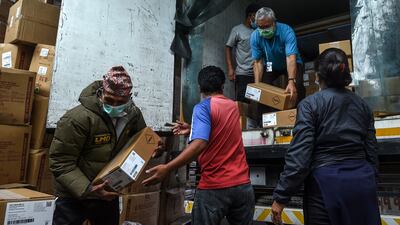More than 240 million coronavirus vaccines bought by rich countries could go to waste by the end of March, raising fresh concerns about unequal access to the shots.
The estimate by data company Airfinity covers vaccines which were bought by G7 or European Union countries but are still sitting in cold storage as their expiry date looms.
More than 90 per cent of people in low-income countries have yet to receive a first vaccine dose despite efforts to distribute shots across the developing world. Health officials and charities blame this in part for creating the perfect conditions for new variants to arise.
“These numbers show that vaccinating the world is now largely a distribution problem and no longer a supply issue,” Airfinity's chief executive Rasmus Bech Hansen said.
“The emergence of Omicron and the likelihood of future variants shows there is no time to waste,” he said, with three doses considered essential to prevent severe disease from the strain currently taking hold across Europe.
Although booster campaigns have used up some of the rich world’s supplies, some doses have remained unused thanks to sceptics and anti-vaxxers refusing injections.
Germany and Austria are lining up vaccine mandates to close this gap, while France’s President Emmanuel Macron recently caused controversy with a provocative promise to pester unvaccinated people.
But shots in reserve do not last forever. The Moderna and Pfizer/BioNTech vaccines expire after nine months in a freezer, while the AstraZeneca-Oxford shot has a six-month shelf life in a regular fridge.
After initially keeping most vaccines for themselves, rich countries have increasingly donated shots via schemes such as Covax. But Airfinity analyst Matt Linley said spare doses should only be delivered if they have at least two months of shelf life left, to allow time for distribution.
With this two-month leeway, as many as 500 million vaccines owned by the developed world would potentially be unusable by the end of March, he said.
Unicef separately said on Thursday that poorer countries turned down more than 100 million vaccines last month because of their short shelf lives.
Etleva Kadilli, the UN agency’s supply director, said countries had also rejected doses because they did not have sufficient storage facilities, such as fridges.
The World Bank said in an economic forecast this week that the unequal access to vaccines “has the potential to leave lasting scars”.
“For example, losses to human capital caused by disruptions in education can spill over across generations,” it said.


